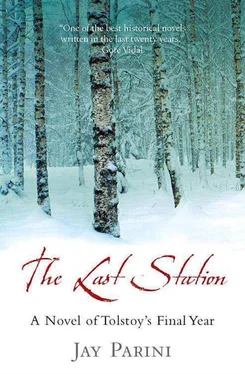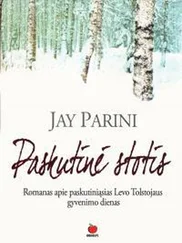The air sparkled, our breath forming a white cloud in front of us. Policemen were everywhere. The tsar, I was told, feared an uprising. Everywhere in Russia the police and the militia had doubled their ranks, and censorship was in effect for all the papers.
But the feelings of the Russian people could not be stifled. People wept openly in the streets. Theaters in Moscow and St Petersburg had closed, and university professors refused to lecture. Masha and I stood behind a delegation of students from Moscow.
I knew, intellectually, that Leo Tolstoy meant a great deal to the Russian people. But I had somehow not understood, not fully, the significance of his life. Of his example.
Sofya Andreyevna stepped from the train, looking dignified and at peace. She, like her husband, had been longing for closure. When people saw her, they began to sing ‘Eternal Memory,’ an old hymn that Leo Nikolayevich was known to admire. The entire station lifted in song. Even the railway conductors sang from their cars.
The coffin appeared, at last. A plain coffin made of dark yellow pine, long and narrow; Leo Nikolayevich’s four strong sons carried it on their shoulders from the railway car to a waiting cart. Muzhiks tossed flowers in their path, singing loudly and weeping. One group of peasants carried a poster that read: ‘Dear Leo Nikolayevich: We remember your goodness. It will never die.’ It was signed, ‘The orphaned muzhiks of Yasnaya Polyana.’
We formed a slow procession to the Tolstoy estate, feet scraping along the frozen road, scuffling through snow, a vast train of two or three thousand people who filed through the majestic white pillars at the entrance to Yasnaya Polyana with heads bent low. By ten-thirty, the coffin had made its way to the entrance of the study where Leo Nikolayevich wrote the words that have burned their way into the collective memory of the race.
Sergey, who had taken charge of the day, opened the coffin, revealing what remained of Leo Tolstoy. And the long, sad procession began.
Leo Nikolayevich did not look like himself. He was shockingly thin, his nose bulbous at the tip but shrunken along the sides. His cheeks were hollow. Someone had combed his hair to the wrong side, and his beard was fluffed out like cotton wool. His lips had been sewn shut to prevent his jaw from dropping open. The skin of his face was splintered like an old plate in a million pieces, holding together by force of habit more than physical substance.
When my turn came to stand beside the coffin, I touched his cold fingers. I prayed, ‘God, accept your son, Leo Nikolayevich, into your eternal arms.’ And I wept openly for the first time that day.
Masha held my hand.
Leo Nikolayevich had asked to be buried near the edge of a ravine in Zasyeka Wood. It was a place where his brother Nikolenka once said that the secret of eternal love was buried, engraved on a green stick. Sasha pointed out the exact spot, and the funeral was held there in the midafternoon – the time of day when Leo Nikolayevich would usually be riding in these woods on Delire. Had I not, in fact, been riding by that very spot with him less than a month before? It seemed impossible…
Wherever one looked, mourners knelt or stood with their heads bent, singing ‘Eternal Memory.’ The solid tree trunks rang aloud with the hymn, which gathered now like a great wave and poured through the woods. Photographers snapped pictures from a thousand angles, and cinematographers cranked their strange, modern machines. A sharp wind made everyone huddle as close together as possible.
Sofya Andreyevna insisted that nobody should speak at the grave. No priest would utter the usual words. There would be no ceremony. Even in his death, Leo Nikolayevich was pointing the way to a new world – a world without false praise, empty ceremonies, foolish disguises. He did not require the blessings of authority.
But an old man, a muzhik, took it upon himself to stand on a stump and deliver a brief sermon about the ‘dear man who had changed their lives.’ Everyone listened in awe. Though his speech was that of an ‘uneducated’ man, it was eloquent and simple. That a peasant – one of the Russian muzhiks so honored by Leo Tolstoy in his writing – should deliver the final words on his behalf seemed wholly just.
At one point several policemen rode through the crowds on black horses. It was a horrible intrusion, but they were immediately surrounded by muzhiks and forced to get off their animals and kneel. To my relief, they obliged.
Suddenly it was snowing. Just a fluff, at first, but soon it thickened, and the gravediggers became anxious. With a signal from Sergey, they began to pour dirt on the coffin, and the crowds – singing ‘Eternal Memory’ even more loudly – began to leave.
‘I feel so empty,’ I said to Masha.
She put her arm through mine. ‘Let’s go inside, Valya. There will be tea and food. I’m freezing !’
‘I’m going with you, Masha,’ I said, holding my ground. ‘Is that all right?’
‘Where?’
‘To Petersburg?’
She turned to me with a strange, bright sweetness. ‘I would like that,’ she said. ‘But come along now.’
Walking back to Yasnaya Polyana in the midst of the crowd, we said nothing more about where we were going or why or when. We were carried along, buoyed up, by a thousand singing voices, men and women who loved Tolstoy as much as we did, who understood, as he did, that death was simply one of life’s many noble transformations, and that nothing mattered in the world but love.
Cover him over, clover.
Grass, you long-baired, wheezy cover,
hold him down.
That dust was man that plucks your roots,
that signals from the dark,
again, again.
That man was both of us,
my gentle reader.
He was fine, they say. No worse
than you are when you leave your bed
unmade, unfilled.
No worse than I am when I eat fresh bread
while elsewhere in the world
the bread is stale.
No worse, no better,
though he tried to heal.
Speak, Russian wind.
Blow harshly from the steppes
and clear the rubble.
Rip tall trees to whistling timber,
stripped of leaves.
The old world’s bare in winter as we leave.
The Last Station is fiction, though it bears some of the trappings and affects of literary scholarship. It began half a decade ago when, browsing in a used bookstore in Naples, I stumbled upon Valentin Bulgakov’s diary of his last year with Leo Tolstoy. Soon I discovered that similar diaries were kept by numerous other members of Tolstoy’s inner circle, which had grown remarkably wide by 1910. I read and reread the memoirs and diaries of Vladimir Chertkov, Sofya Andreyevna Tolstoy, Ilya and Leo, Sergey, Tanya, and Alexandra (Sasha) Tolstoy, Dushan Makovitsky, and others. Reading them in succession was like looking at a constant image through a kaleidoscope. I soon fell in love with the continually changing symmetrical forms of life that came into view.
A novel is a voyage by sea, a setting out into strange waters, but I have sailed as close as I could to the shoreline of literal events that made up the last year of Tolstoy’s life. Whenever Tolstoy speaks in this novel, I quote his actual words or, less often, I create dialogue based on conversations reported indirectly. Elsewhere, I have freely imagined what might have, could have, or should have been said.
In addition to the diaries mentioned, I have relied for chronology and circumstantial details on well-known biographies of Leo Tolstoy by Aylmer Maude, Edward A. Steiner, Ernest J. Simmons, Henri Troyat, and A. N. Wilson. Anne Edwards’s life of Sofya Andreyevna Tolstoy was also useful. I would refer the interested reader to the book I depended on for bibliographical information: Leo Tolstoy: An Annotated Bibliography of English-language Sources to 1978 by David R. Egan and Melinda A. Egan (Metuchen, N.J., and London, 1979).
Читать дальше












